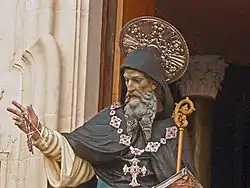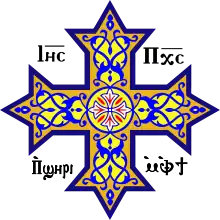Saint Barsanuphius | |
|---|---|
 Statue of Saint Barsanuphius at Oria | |
| Died | c. 545 |
| Venerated in | Roman Catholic Church Eastern Orthodox Church Oriental Orthodox Church |
| Major shrine | Oria |
| Feast | April 11; February 6 (Eastern and Oriental Orthodox Church); at Oria February 20 and August 29 and August 30 |
| Patronage | Oria |
| Influences | Seridus of Gaza, Dorotheus of Gaza |
Barsanuphius (Greek: Βαρσανούφιος, romanized: Barsanouphios; Arabic: برسانوف, romanized: Barsanūf; Italian: Barsonofio, Barsanofrio, Barsanorio; died c. 545), also known as Barsanuphius of Palestine, Barsanuphius of Gaza or Barsanuphius the Great (in Eastern Orthodoxy), was a Christian hermit and writer of the sixth century.
Life
Born in Egypt, he lived in absolute seclusion for fifty years, and then near the monastery of Seridus of Gaza of Gaza in Palestine. He wrote many letters, 800 of which have survived. He corresponded mainly with John the Prophet, abbot of the monastery of Merosala and teacher of Dorotheus of Gaza.[1]
At the old age he convinced the emperor to renew the concordant relationship with the Church of Jerusalem.
Veneration
His relics arrived in Oria, in Italy, with a Palestinian monk in 850 AD and placed in the present-day church of San Francesco da Paola by Bishop Theodosius. During a Moorish siege and taking of the city, the relics were lost but then later rediscovered and placed in the city's basilica.
At Oria he is considered to have saved the city from destruction wrought by foreign invaders. A legend states that he repelled a Spanish invasion by appearing before the Spanish commander armed with a sword. During World War II, he is said to have spread his blue cape across the sky, thus causing a rainstorm, and preventing an air bombing by Allied Forces.
References
- ↑ Barsanuphius and John Letters, translated by John Chryssavgis Catholic University of America Press (2002)
External links
- (in Italian) San Barsanofio
 Media related to Barsanuphius of Palestine at Wikimedia Commons
Media related to Barsanuphius of Palestine at Wikimedia Commons
